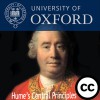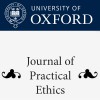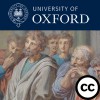Faculty of Philosophy

Oxford is one of the world's great centres for philosophy. More than one hundred and fifty professional philosophers work in the University and its colleges, between them covering a vast range of subjects within philosophy. Many are international leaders in their fields. The Faculty of Philosophy is one of the largest departments of philosophy in the world, and is widely recognized to be amongst the best.
Its reputation draws many distinguished visiting philosophers; each year around fifty philosophers from around the world give lectures or seminars in Oxford. Almost every major philosopher speaks in Oxford at some time.
Each year, more than five hundred undergraduates are admitted to study philosophy in Oxford, always in combination with another subject. The Faculty also has more than a hundred graduate students, who are either taking a taught graduate degree or working for a doctorate.
Oxford is a collegiate university, and every registered student becomes a member of one of the colleges. In this way, he or she has access, not only to the very extensive libraries and facilities of the University, but also to the varied and more intimate life of a college. Colleges offer their students excellent libraries and facilities of their own.
Teaching at Oxford is by lectures and seminars, and by tutorials or supervisions. Courses of lectures and seminars are offered on a very large range of topics, for both undergraduates and graduates. Tutorials are a special feature of Oxford; undergraduates receive regular and frequent tutorials either individually or in pairs from members of the Faculty. All graduate students also receive frequent individual supervisions.
Oxford University dates from the 12th Century or before. The first colleges were founded in the 13th Century. The ancient buildings remain, mingled with magnificent architecture from subsequent centuries, to make Oxford one of the most inspiring and beautiful cities in the world. Within this setting, Oxford remains at the forefront of philosophy.
Series associated with Faculty of Philosophy
| # | Episode Title | Description | People | Date | |
|---|---|---|---|---|---|
| 438 | The Contribution of Neuroethics for Responsible Management Education | Paper presented by José Félix Lozano Aguilar at the MT16 Oxford-Valencia Neuroethics Workshop. | José Félix Lozano Aguilar | 23 Nov 2016 | |
| 437 | Neurointerventions to Prevent Crime and the Problem of Unjustified Incarceration | Paper presented by Katrien Devolder at the MT16 Oxford-Valencia Neuroethics Workshop. | Katrien Devolder | 23 Nov 2016 | |
| 436 | The New Problem of Personal Force in Morality | Paper presented by Emilian Mihailov at the MT16 Oxford-Valencia Neuroethics Workshop. | Emilian Mihailov | 23 Nov 2016 | |
| 435 | Can we Dissociate Reason from Feelings? Ten Critical Philosophical Questions to Greene's Dual Process Theory | Paper presented by Javier Gracia and Andrés Richard at the MT16 Oxford-Valencia Neuroethics Workshop. | Javier Gracia, Andrés Richard | 23 Nov 2016 | |
| 434 | Moral Reasoning is Not Like a Dog's Tail: A Critical Analysis of Social Intuitionism's Two Illusions of Moral Deliberation | Paper presented Pedro Jesús Pérez Zafrilla the MT16 Oxford-Valencia Neuroethics Workshop. | Pedro Jesús Pérez Zafrilla | 23 Nov 2016 | |
| 433 | Homo reciprocans from Neuroscience: a limited reciprocity. A criticism from neuroethics | Paper presented by Elsa González Esteban at the MT16 Oxford-Valencia Neuroethics Workshop. | Elsa González Esteban | 23 Nov 2016 | |
| 432 | No pain, no praise: motivational enhancement and the meaning of life | Paper presented by Julian Savulescu at the MT16 Oxford-Valencia Neuroethics Workshop. | Julian Savulescu | 23 Nov 2016 | |
| 431 | Uehiro-Carnegie-Oxford Lecture in Practical Ethics 2016 | Human Rights, Global Ethics and the Ordinary Virtues | Michael Ignatieff | 23 Nov 2016 | |
| 430 | 2016 Annual Uehiro Lecture 3: Foundation for Frogs | Professor Shelly Kagan delivers the final of three Annual Uehiro Lectures in Practical Ethics, ‘How to Count Animals, More or Less’ | Shelly Kagan | 23 Nov 2016 | |
| 429 | 2016 Annual Uehiro Lecture 2: Deontology for Dogs | Professor Shelly Kagan delivers the second of three Annual Uehiro Lectures in Practical Ethics, ‘How to Count Animals, More or Less’ | Shelly Kagan | 23 Nov 2016 | |
| 428 | 2016 Annual Uehiro Lecture 1: Consequentialism for Cows | Professor Shelly Kagan delivers the first of three Annual Uehiro Lectures in Practical Ethics, ‘How to Count Animals, More or Less’ | Shelly Kagan | 23 Nov 2016 | |
| 427 | What if Kant were a designer? | Constantin Vică presents work in the MT16 Oxford-Bucharest Work in Progress Workshop | Constantin Vică | 22 Nov 2016 | |
| 426 | Designing for conviviality | Cristina Voinea presents work at the MT16 Oxford-Bucharest Work in Progress Workshop. | Cristina Voinea | 22 Nov 2016 | |
| 425 | Parfitian Survival and Punishing Crimes from the Distant Past | Tom Douglas' presentation at the MT16 Oxford- Bucharest Work in Progress Workshop | Tom Douglas | 22 Nov 2016 | |
| 424 | Creative Commons | Offsetting Class Privilege | Holly Lawford-Smith discusses her Journal of Practical Ethics article, Offsetting Class Privilege | Holly Lawford-Smith, David Edmonds | 22 Jul 2016 |
| 423 | St Cross Seminar: The role of therapeutic optimism in recruitment to a clinical trial: an empirical study | In this St Cross Special Ethics Seminar, Dr Nina Hallowell discusses the importance of therapeutic optimism in clinical research. | Nina Hallowell | 16 May 2016 | |
| 422 | St Cross Seminar: Cognitive Enhancement: Defending the Parity Principle | In this episode, Professor Neil Levy assesses objections to cognitive enhancement and argues that the means don't matter from a moral perspective: what matters is how the intervention affects cognition. | Neil Levy | 17 Mar 2016 | |
| 421 | Creative Commons | Leverhulme Lecture 2: Moral Responsibility and Implicit Bias | The second of the two 2016 Leverhulme Lectures by Professor Neil Levy on the topic of implicit bias | Neil Levy | 23 Feb 2016 |
| 420 | Creative Commons | Leverhulme Lecture 1: The Nature and the Significance of Implicit Bias | The first of the two 2016 Leverhulme Lectures by Professor Neil Levy on the topic of implicit bias | Neil Levy | 23 Feb 2016 |
| 419 | 2015 Uehiro Lectures: Temporal Parochialism and Its Discontents | The first of the three 2015 Annual Uehiro Lectures 'Why Worry About Future Generations'. Why should we care about what happens to human beings in the future, after we ourselves are long gone? | Samuel Scheffler | 02 Feb 2016 | |
| 418 | St Cross Seminar: Governing life: is it wrong to intervene in biological processes? | In this seminar we explore why human interventions such as euthanasia or use of biotechnologies are controversial. | Virginie Tournay | 01 Feb 2016 | |
| 417 | 2015 Uehiro Lectures: Conservatism, Temporal Bias, and Future Generations | The last of the three 2015 Annual Uehiro Lectures 'Why Worry About Future Generations'. Why should we care about what happens to human beings in the future, after we ourselves are long gone? | Samuel Scheffler | 01 Feb 2016 | |
| 416 | 2015 Uehiro Lectures: Reasons to Worry | The second of the three 2015 Annual Uehiro Lectures 'Why Worry About Future Generations'. Why should we care about what happens to human beings in the future, after we ourselves are long gone? | Samuel Scheffler | 01 Feb 2016 | |
| 415 | Conscientious Objection in Healthcare Conference: Roundtable discussion | Panel discussion at a conference on conscientious objection in medicine and the role of conscience in healthcare practitioners’ decision making, Oxford 2015. | Katrien Devolder, Richard Sorabji, Jeff McMahan, Walter Sinnott-Armstrong | 09 Dec 2015 | |
| 414 | Kant, conscience, and professional roles | A conference on conscientious objection in medicine and the role of conscience in healthcare practitioners’ decision making, Oxford 2015. | Jeanette Kennett | 09 Dec 2015 | |
| 413 | Medicine and morally messy relationships | A conference on conscientious objection in medicine and the role of conscience in healthcare practitioners’ decision making, Oxford 2015. | Kimberley Brownlee | 09 Dec 2015 | |
| 412 | Reasons, moral integrity, and conscientious objection | A conference on conscientious objection in medicine and the role of conscience in healthcare practitioners’ decision making, Oxford 2015. | Mark Wicclair | 09 Dec 2015 | |
| 411 | Two concepts of conscience and their implications for conscience-based refusal | A conference on conscientious objection in medicine and the role of conscience in healthcare practitioners’ decision making, Oxford 2015. | Steve Clarke | 07 Dec 2015 | |
| 410 | Refusing to treat sexual dysfunction in sex offenders | A conference on conscientious objection in medicine and the role of conscience in healthcare practitioners’ decision making, Oxford 2015. | Tom Douglas | 07 Dec 2015 | |
| 409 | Objection to conscience. On good and bad objections in medicine | A conference on conscientious objection in medicine and the role of conscience in healthcare practitioners’ decision making, Oxford 2015. | Alberto Giubilini | 07 Dec 2015 | |
| 408 | My conscience may be my guide, but you may not have to honour it | A conference on conscientious objection in medicine and the role of conscience in healthcare practitioners’ decision making, Oxford 2015. | Hugh LaFollette | 07 Dec 2015 | |
| 407 | Conscientious objection and complicity in wrongdoing | A conference on conscientious objection in medicine and the role of conscience in healthcare practitioners’ decision making, Oxford 2015. | Francesca Minerva | 07 Dec 2015 | |
| 406 | The proper place of conscience and values | A conference on conscientious objection in medicine and the role of conscience in healthcare practitioners’ decision making, Oxford 2015. | Julian Savulescu | 07 Dec 2015 | |
| 405 | Conscientious objection and 'effective referral' | A conference on conscientious objection in medicine and the role of conscience in healthcare practitioners’ decision making, Oxford 2015. | Roger Trigg | 07 Dec 2015 | |
| 404 | Conscientious non-objection and medical dissensus in intensive care | A conference on conscientious objection in medicine and the role of conscience in healthcare practitioners’ decision making, Oxford 2015. | Dominic Wilkinson | 07 Dec 2015 | |
| 403 | We Want Kids, Too: Should Doctors be Allowed to Refuse to Help Gay Couples have Children? | A conference on conscientious objection in medicine and the role of conscience in healthcare practitioners’ decision making, Oxford 2015. | Walter Sinnott Armstrong, Aaron Ancell | 07 Dec 2015 | |
| 402 | St Cross Seminar: Justifications for Non-Consensual Medical Intervention: From Infectious Disease Control to Criminal Rehabilitation | Dr Jonathan Pugh discusses the morally permissibility of non-consensual medical interventions. | Jonathan Pugh | 18 Nov 2015 | |
| 401 | Creative Commons | Ethical and Social Issues in Shared Virtual Environments Revisited | Talk delivered at 2015 Cyberselves Symposium, with contributions from technologists, psychologists, neuroscientists, philosophers and cultural theorists looking at the future societal and ethical impacts of virtual reality and immersive technologies. | Ralph Schroeder | 16 Nov 2015 |
| 400 | Creative Commons | The Soul of the Machine: The multi-layered structure of a synthetic self | Talk delivered at 2015 Cyberselves Symposium, with contributions from technologists, psychologists, neuroscientists, philosophers and cultural theorists looking at the future societal and ethical impacts of virtual reality and immersive technologies | Paul Verschure | 16 Nov 2015 |
| 399 | Creative Commons | The Smart Mandate: A Brief History of Ubiquitous Computing and Responsive Environments | Talk delivered at 2015 Cyberselves Symposium, with contributions from technologists, psychologists, neuroscientists, philosophers and cultural theorists looking at the future societal and ethical impacts of virtual reality and immersive technologies. | Orit Halpern | 16 Nov 2015 |
| 398 | Creative Commons | Virtually anything goes: what, if any, are the ethical limits on behaviour in virtual worlds? | Talk delivered at 2015 Cyberselves Symposium, with contributions from technologists, psychologists, neuroscientists, philosophers and cultural theorists looking at the future societal and ethical impacts of virtual reality and immersive technologies. | Blay Whitby | 16 Nov 2015 |
| 397 | Creative Commons | Deliberation welcomes prediction | Alan Hájek (Australian National University) gives a talk for the New Insights seminar series on 21st May 2015. | Alan Hájek | 24 Jul 2015 |
| 396 | Reasoning with Plenitude | Roger White (MIT) gives the final talk in the New Insights in Religious Epistemology International Conference, held in Oxford in June 2015. | Roger White | 14 Jul 2015 | |
| 395 | Testimony, Error, and Reasonable Belief in Medieval Religious Epistemology | Richard Cross (Notre Dame) gives a talk in the New Insights in Religious Epistemology International Conference, held in Oxford in June 2015. The commentator is Christina Van Dyke, Calvin | Richard Cross, Christina Van Dyke | 14 Jul 2015 | |
| 394 | Fine-Tuning Fine-Tuning | John Hawthorne (Oxford/USC) gives a talk in the New Insights in Religious Epistemology International Conference, held in Oxford in June 2015. | John Hawthorne | 14 Jul 2015 | |
| 393 | What is Justified Group Belief | Jennifer Lackey (Northwestern) gives a talk in the New Insights in Religious Epistemology International Conference, held in Oxford in June 2015. | Jennifer Lackey | 14 Jul 2015 | |
| 392 | Foundations of the Fine-Tuning Argument | Hans Halvorson (Princeton) give a talk in the New Insights in Religious Epistemology International Conference, held in Oxford in June 2015. The commentator is John Pittard (Yale). | Hans Halvorson, John Pittard | 14 Jul 2015 | |
| 391 | How to Appear to Know that God Exists | Keith DeRose (Yale), gives a talk in the New Insights in Religious Epistemology International Conference, held in Oxford in June 2015. The commentator is Jane Friedman (NYU). | Keith DeRose, Jane Friedman | 14 Jul 2015 | |
| 390 | Show and Tell | Paulina Sliwa (Cambridge) gives the first talk in the New Insights in Religious Epistemology International Conference, held in Oxford in June 2015. | Paulina Sliwa | 14 Jul 2015 | |
| 389 | The Rev’d Mr Bayes and the Life Everlasting | Peter van Inwagen (Notre Dame) gives the second talk for the New Insights in Religious Epistemology International Conference, held in Oxford in June 2015. The commentator is Jeffrey Sanford Russell (USC). | Peter Van Inwagen, Jeffrey Sanford Russell | 14 Jul 2015 | |
| 388 | Phenomenal Conservatism and Religious Belief | Richard Swinburne, University of Oxford, gives the first talk in the New Insights in Religious Epistemology International Conference, held in Oxford in June 2015. | Richard Swinburne | 14 Jul 2015 | |
| 387 | Creative Commons | Moral Conformity | Sinnott-Armstrong is the Chauncey Stillman Professor of Ethics at Duke University. | Walter Sinnott-Armstrong | 14 Jul 2015 |
| 386 | Creative Commons | Happiness, Unhappiness, and Suffering | Hawkins is Associate Research Professor of Philosophy and Trent Scholar in Bioethics at Duke University. | Jennifer Hawkins, Jeff McMahan | 14 Jul 2015 |
| 385 | Creative Commons | Toward a Naturalistic Theory of Moral Progress | Buchanan is James B. Duke Professor of Philosophy at Duke University. | Allen Buchanan | 14 Jul 2015 |
| 384 | Creative Commons | Can you choose to be gay? | Brian Earp discusses the ethics of sexual orientation. | Brian Earp, Nigel Warburton, David Edmonds | 14 Jul 2015 |
| 383 | St Cross Seminar: The 'New' Guestworker? Rethinking the Ethics of Temporary Labour Migration Programme | This talk probes into the ethical landscape of contemporary TLMPs in liberal democratic states, and examines issues such as migrants' rights. | Mimi Zou | 10 Jun 2015 | |
| 382 | St Cross Seminar: The moral insignificance of self-consciousness | In this talk, Dr Josh Shepherd examines the claim that self-consciousness is highly morally significant. | Joshua Shepherd | 10 Jun 2015 | |
| 381 | Brain Science and the Military | In this talk I explain the nature of national security interest in the burgeoning field of neuroscience and its implications for military and counter-intelligence operations. | Jonathan Moreno | 17 Apr 2015 | |
| 380 | Creative Commons | 2015 Leverhulme Lecture (3): Marshmallows and Moderation | Is self-control a character trait or should we look to external props for self-control? | Neil Levy | 10 Mar 2015 |
| 379 | Creative Commons | 2015 Leverhulme Lecture (2): The Science of Self-Control | This lecture outlines some of the main perspectives on self-control and its loss stemming from recent work in psychology. | Neil Levy | 09 Mar 2015 |
| 378 | Creative Commons | 2015 Leverhulme Lecture (1): Self-Control: A problem of self-management | Self-control problems typically arise from conflicts between smaller sooner and larger later rewards. | Neil Levy | 04 Mar 2015 |
| 377 | Creative Commons | St Cross Seminar: On Swearing | What, if anything, is wrong with swearing? And, what exactly are we doing when we try to swear inoffensively? | Rebecca Roache | 23 Feb 2015 |
| 376 | Skeptical Theism and the Future | First talk given by Cameron Domenico Kirk-Giannini (Rutgers) at the New Insights and Directions for Religious Epistemology Workshop on Formal Epistemology and Religious Epistemology, Oxford University, 8 December 2014. | Cameron Domenico Kirk-Giannini | 09 Feb 2015 | |
| 375 | Foundations for an Accuracy-based Approach to Imprecise Credence | Second talk given by Jason Konek (Bristol) and Billy Dunaway (Oxford) at the New Insights and Directions for Religious Epistemology Workshop on Formal Epistemology and Religious Epistemology, Oxford University, 8 December 2014. | Jason Konek, Billy Dunaway | 09 Feb 2015 | |
| 374 | Divine Indifference, or Whatever | Third talk given by Jonathan Weisberg (Toronto) at the New Insights and Directions for Religious Epistemology Workshop on Formal Epistemology and Religious Epistemology, Oxford University, 8 December 2014. | Jonathan Weisberg | 09 Feb 2015 | |
| 373 | Against the Orthodoxy: Rethinking Epistemic Reasons and Pascal's Wager | Fourth talk given by Rima Basu (USC) at the New Insights and Directions for Religious Epistemology Workshop on Formal Epistemology and Religious Epistemology, Oxford University, 9 December 2014. | Rima Basu | 09 Feb 2015 | |
| 372 | Salvaging Pascal's Wager | Fifth talk given by Liz Jackson (Nortre Dame) at the New Insights and Directions for Religious Epistemology Workshop on Formal Epistemology and Religious Epistemology, Oxford University, 9 December 2014. | Liz Jackson | 09 Feb 2015 | |
| 371 | Updating on Evil | Sixth and final talk given by Professor Roger White (MIT) at the New Insights and Directions for Religious Epistemology Workshop Formal Epistemology and Religious Epistemology, Oxford University, 9 December 2014. | Roger White | 06 Feb 2015 | |
| 370 | Creative Commons | St Cross Seminar: Mere Practicality? Infants, interests and the value of life | Dr Richard Hain, Consultant in Paediatric Palliative Medicine, explores the difficulties in rationally explaining the value of an infant’s life. | Richard Hain | 04 Feb 2015 |
| 369 | St Cross Seminar: Natural Human Rights: A Theory | This talk explores the central argument in Boylan's recent book, 'Natural Human Rights: A Theory' | Michael Boylan | 03 Dec 2014 | |
| 368 | Bioethics and the Burden of Proof | In this paper we critique a kind of argument very common in bioethical debates, in which a proponent provides a prima facie case for a particular conclusion, then claims that the burden of proof is on those that object to that conclusion. | Michael Selgelid | 14 Nov 2014 | |
| 367 | Implicit Moral Attitudes | Research shows that implicit moral attitudes affect our thinking and behavior. This talk reports new psychological and neuroscientific research and explores potential implications for scientific moral psychology as well as for some philosophical theories. | Walter Sinnott-Armstrong | 14 Nov 2014 | |
| 366 | The ethics of sexuality | Professor Janet Radcliffe Richards argues that homosexuality is natural, and that what is natural can be neither good nor bad. | Janet Radcliffe Richards, Nigel Warburton, David Edmonds | 04 Nov 2014 | |
| 365 | Should we allow genetic engineering on embryos? | Does a human embryo have moral status? Tom Douglas explores the ethical issues surrounding genetic research on developing embryos. | Tom Douglas, Nigel Warburton, David Edmonds | 28 Oct 2014 | |
| 364 | Is there such a thing as a just war? | Is an ethical war a paradoxical notion? If violence is almost always unacceptable, how can we justify acts of war? | Jeff McMahan, Nigel Warburton, David Edmonds | 21 Oct 2014 | |
| 363 | The Dappled Causal World of Psychiatric Disorders: The Link Between the Classification of Psychiatric Disorders and Their Causal Complexity | The second of the 2014 Loebel Lectures in Philosophy and Psychiatry, by Professor Kenneth S Kendler | Kenneth S Kendler | 21 Oct 2014 | |
| 362 | The Genetic Epidemiology of Psychiatric and Substance Abuse Disorders: Multiple Levels, Interactions and Causal Loops | The first of the 2014 Loebel Lectures in Philosophy and Psychiatry, by Professor Kenneth S Kendler | Kenneth S Kendler | 16 Oct 2014 | |
| 361 | The rights and wrongs of abortion | Rebecca Roache discusses the conflicting rights and interests of both foetus and mother. | Rebecca Roache, Nigel Warburton, David Edmonds | 14 Oct 2014 | |
| 360 | Creative Commons | Choosing the sex of your child | Is sex-selection harmful or injust? Julian Savulescu outlines four methods used in sex-selection and explores the ethical issues surrounding each. | Julian Savulescu, Nigel Warburton, David Edmonds | 06 Oct 2014 |
| 359 | Creative Commons | Free will, and its connection to moral responsibility | Professor Neil Levy explores the link between free will and responsibility. What makes us blameworthy for our actions? | Neil Levy, Nigel Warburton, David Edmonds | 29 Sep 2014 |
| 358 | Creative Commons | What is virtue ethics? | In this episode, Professor Roger Crisp introduces the strand of ethical theory known as 'virtue ethics'. | Roger Crisp, Nigel Warburton, David Edmonds | 22 Sep 2014 |
| 357 | Creative Commons | Should euthanasia be legal? | Dr Dominic Wilkinson, Director of Medical Ethics at the Oxford Uehiro Centre for Practical Ethics, explores the ethical issues surrounding euthanasia and asks whether it should be made legal. | Dominic Wilkinson, Nigel Warburton, David Edmonds | 22 Jul 2014 |
| 356 | Creative Commons | Epistemic Intuitions and Defeaters for Noninferential Religious Belief | Sixth and final talk given by Professor Michael Bergmann (Purdue) at the Defeat and Religious Epistemology for the New Insights and Directions in Religious Epistemology Workshop, Oxford University on 17th March 2014 | Michael Bergmann | 15 Jul 2014 |
| 355 | Creative Commons | Defeaters, Proper Functioning, and the Evolutionary Argument against Naturalism | Fifth talk given by Professor Edward Wierenga (Rochester) at the Defeat and Religious Epistemology for the New Insights and Directions in Religious Epistemology Workshop Oxford University held on 17th March 2014 | Edward Wierenga | 15 Jul 2014 |
| 354 | Creative Commons | Fundamental Disagreements and Defeat | Fourth talk given by Professor John Pittard (Yale Divinity School) at the Defeat and Religious Epistemology for the New Insights and Directions in Religious Epistemology Workshop, Oxford University on 18th March 2014 | John Pittard | 15 Jul 2014 |
| 353 | Creative Commons | (Undercutting) Epistemic Defeat and the 'Conciliatory' Road to Agnosticism | Second talk given by Dr. J. Adam Carter (Edinburgh) at the Defeat and Religious Epistemology from the New Insights and Directions in Religious Epistemology Workshop, Oxford University held on 17th March 2014 | J Adam Carter | 15 Jul 2014 |
| 352 | Creative Commons | Defeat, Testimony, and Miracles | First talk given by Dr Charity Anderson (Oxford) at the Defeat and Religious Epistemology from the New Insights and Directions in Religious Epistemology Workshop Oxford University on 17th March 2014 | Charitt Anderson | 15 Jul 2014 |
| 351 | Religious Belief and the Epistemology of Testimony | Jennifer Lackey (Northwestern) gives the seventh and last presentation, as part of the Testimony and Religious Epistemology workshop, held on 24th and 25th June 2014 by New Insights and Directions for Religious Epistemology Workshop,Oxford University. | Jennifer Lackey | 08 Jul 2014 | |
| 350 | Epistemic Trust in Oneself and Others – An Argument from Analogy | Lizzie Fricker (Oxford), gives the sixth presentation Testimony and Religious Epistemology workshop, held on 24th and 25th June 2014 by New Insights and Directions for Religious Epistemology Workshop, Oxford University | Lizzie Fricker, Mikkel Gerken | 08 Jul 2014 | |
| 349 | Limits on Religious Testimony: Lessons on Morality | Laura Callahan (Oxford) gives the fifth presentation at the Testimony and Religious Epistemology workshop, held on 24th and 25th June 2014 by New Insights and Directions for Religious Epistemology Workshop Oxford University. | Laura Callahan, Peter Graham | 08 Jul 2014 | |
| 348 | Can Anti-Reductionism in the Epistemology of Testimony aid the case of Justified Religious Belief? | Sandford Goldberg (Northwestern) gives the fourth presentation at the Testimony and Religious Epistemology held on 24th and 25th June 2014 by New Insights and Directions for Religious Epistemology Workshop, Oxford University. | Sandford Goldberg, John Hawthorne | 08 Jul 2014 | |
| 347 | Understanding and Knowing by Testimony | Paulina Sliwa (Cambridge) gives the third presentation of the Testimony and Religious Epistemology workshop geld onb 24th and 25th June 2014 by New Insights and Directions for Religious Epistemology Workshop, Oxford University. | Paulina Sliwa, Alison Hills | 08 Jul 2014 | |
| 346 | An internalist, evidentialist, foundationalist, reductionist, egoist and otherwise unpopular account of testimonial justification | Trent Dougherty (Baylor), gives the second presentation at the Testimony and Religious Epistemology workshop, held on 24th and 25th June 2014 by New Insights and Directions for Religious Epistemology Workshop Oxford University. | Trent Dougherty | 08 Jul 2014 | |
| 345 | Those Unwise People Still Dwelling in Their Senses’: Religious Speech, Moral Testimony and Audience (Mis)understanding | Rachel Fraser (Oxford) gives the first presentation of the Testimony and Religious Epistemology, held on 24th and 25 June 2014 by the New Insights and Directions for Religious Epistemology Workshop Oxford University. | Rachel Fraser, Max Baker-Hytch | 08 Jul 2014 | |
| 344 | Creative Commons | Special Seminar: The enhancement debate: trusting emotion or trusting reason - a false dichotomy? | In this talk, Professor Tony Coady examines the contrast between reason and emotion and argues that much of the separation of reason and emotion that underpins the debate is misguided. | Tony Coady | 16 Jun 2014 |
| 343 | Creative Commons | St Cross Seminar: What counts as a placebo is relative to a target disorder and therapeutic theory: defending a modified version of Grünbaum’s scheme | In this St Cross Special Ethics Seminar, Jeremy Howick defends Grünbaum’s work on placebos. He outlines a need to re-examine policies on ethics of placebos, and revise our estimations of their effects in both clinical practice and trials. | Jeremy Howick | 16 Jun 2014 |
| 342 | Creative Commons | St Cross Seminar: "I wouldn’t have consented if I’d known that could happen": Consenting without Understanding | Tom Walker discusses autonomy and informed consent to medical treatment | Tom Walker | 19 May 2014 |
| 341 | Creative Commons | Reid on the Principles of Morals | The final part of Professor Dan Robinson's series on Reid's critique of David Hume. | Dan Robinson | 14 May 2014 |
| 340 | Creative Commons | Hume’s “Sentimentalist” Theory of Morals | The seventh part of Professor Dan Robinson's series on Reid's critique of David Hume. | Dan Robinson | 14 May 2014 |
| 339 | Creative Commons | Reid on Personal Identity | The sixth part of Professor Dan Robinson's series on Reid's critique of David Hume. | Dan Robinson | 14 May 2014 |
- ‹ previous
- 3 of 7
- next ›


































